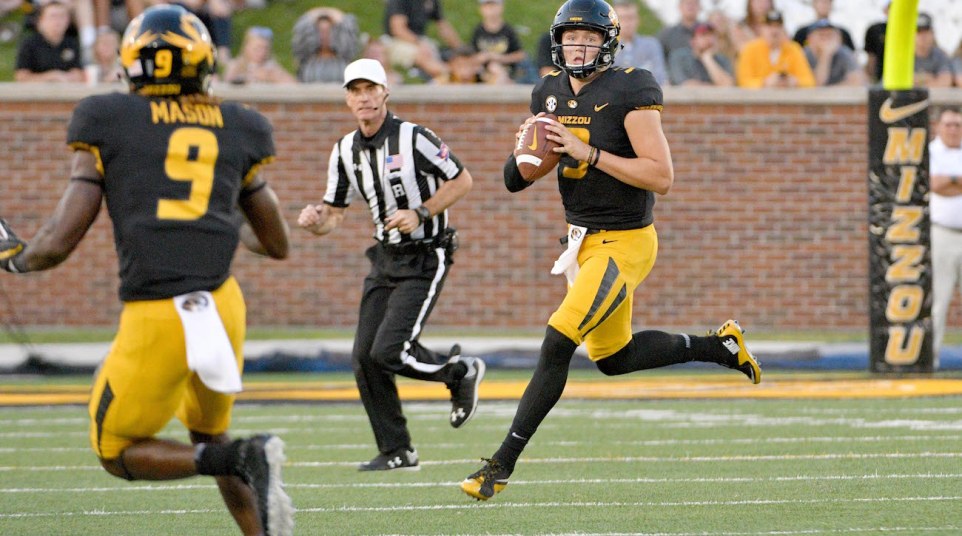
Offense, not defense, disappoints in Mizzou’s Week 2 loss to Gamecocks
As the old saying goes, “If it ain’t broke, don’t fix it.” It’s cliche, yes, but cliches are around for a reason — they’re usually accurate.
On Saturday, the Missouri Tigers ignored that sage advice and tried to revamp their passing game, ditching longer passes and quick screens to explosive receivers like Johnathon Johnson in favor of more mid-range routes that didn’t exactly work.
Of course, it would be foolish to continue this article without mentioning the fact that the South Carolina defense is much better that Missouri State’s, but Mizzou’s offensive woes on Saturday night were still stunning.
On a night when the defense took several steps forward, the offense took several disappointing steps back, and there was plenty of blame to go around.
Here’s a look back at what went wrong in Mizzou’s 31-13 home loss to the Gamecocks:
The quarterback
A look at junior QB Drew Lock’s numbers is all one needs to understand what went wrong.
Lock completed only 14 of his 32 pass attempts, and while those completions went for a solid 245 yards, he only managed one touchdown (after tossing seven the previous week) and also threw two interceptions.
Taking care of the ball against tough opponents was an issue for Lock last year, and after one game against an SEC defense, it appears those struggles are still present. Lock also threw only one touchdown and two interceptions against South Carolina last season, so it was a bit disheartening to see him struggle once again in his first test against a tough unit this year.
With Auburn coming to Columbia in two short weeks, things could get much worse before they get better for Lock.
The receivers
After a solid Week 1 effort, it appeared as though the drops that plagued the Tigers’ receivers last year were a thing of the past.
Unfortunately, that was not the case, as Mizzou receivers dropped a whopping four passes against the Gamecocks, a couple of which killed promising drives.
Redshirt senior J’Mon Moore had two drops on balls that he normally catches in his sleep. Dimetrios Mason had a big drop on a play that would have gone for a first down.
Yes, Lock struggled, but his receivers did him no favors, either.
The coordinator
As mentioned above, the Mizzou offense looked a lot different on Saturday night than it did in Week 1, which is partially a credit to the Gamecocks’ defense and partially a problem with OC Josh Heupel’s play-calling.
Lock has one of the strongest arms in the SEC, yet he didn’t get the chance to show it off much against South Carolina, as Heupel didn’t call many deep shots.
Considering Lock was only sacked one time all night, it’s not like the offensive line wasn’t giving him time to let a longer pass route develop, it just simply didn’t appear to be in the game plan.
Moving forward, Mizzou’s offense needs to at least attempt a few deep throws in every game. Even if Lock doesn’t connect with a receiver on those plays, it opens up more room for the running backs by keeping the safeties deep.
The time-of-possession woes
For the second straight week, the Tigers were dominated in time of possession, holding the football for only 22 minutes, 24 seconds, while the Gamecocks enjoyed nearly 38 minutes on offense.
When the Mizzou offense isn’t clicking, it leads to a lot of quick three-and-outs, and even drives with one or two first downs only take a couple of minutes off the clock.
That hurts the defense, forcing it to defend for 2 ½ quarters. So, though the Tigers allowed 31 points on Saturday night, it’s fair to say the defense played much better than it did while allowing 43 points to Missouri State.
As the Tigers prepare to host a surprisingly potent Purdue offense next weekend, coach Barry Odom needs to figure out how to get both of his units on the same page.
